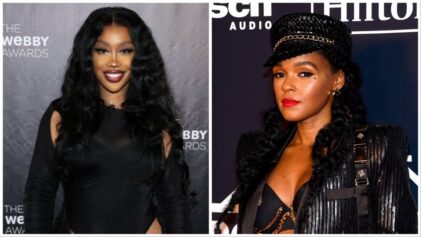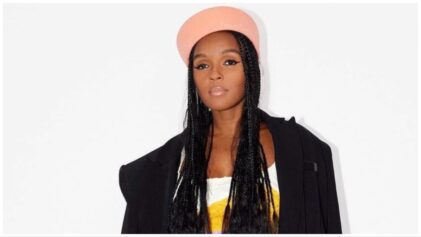[playwirevid id=’3805994′]
Janelle Monáe’s support of the Black Lives Matter movement may have led the singer to be cut off after appearing Friday on NBC’s Today Show.
Monáe performed a medley of songs on the morning show, including an updated version of her 2013 release, “Hell You Talmbout.” The single now features Monáe and fellow artists from her Wondaland Records imprint reciting the names of Blacks killed by police or gun toting civilians. Walter Scott, Michael Brown and Trayvon Martin are among the long list of African-Americans mentioned on the track.
After performing the song on the Today Show, Monáe said, “Yes, Lord. God bless America. God bless all who’ve lost lives to police brutality. We want white America to know that we stand tall today. We want Black America to know that we stand tall today. We will not be silenced.”
Ironically, right after she vowed to be heard, a Today Show anchor cut in, telling viewers, “We’ll have much more from Janelle Monáe … coming up.” In other words, Monáe very likely received the “shut up and sing” treatment from the network, which has yet to comment on the situation. It’s telling, however, that the Today Show website includes videos of all the songs Monáe performed except “Hell You Talmbout.”
Last week on Instagram, Monáe described the song as a “vessel.”
“It carries the unbearable anguish of millions,” she said. “We recorded it to channel the pain, fear, and trauma caused by the ongoing slaughter of our brothers and sisters. We recorded it to challenge the indifference, disregard, and negligence of all who remain quiet about this issue. Silence is our enemy. Sound is our weapon. They say a question lives forever until it gets the answer it deserves… Won’t you say their names?”
The song and her closing remarks on the Today Show aren’t the only ways Monáe has tried to raise awareness about Black Lives Matter. She also led a demonstration in Philadelphia last week during which she encouraged participants to recite the names of Blacks who’ve lost their lives at the hands of those who swear to protect and serve the public.
“Won’t you say their names?” she asked the marchers. “Can we say their names right now? Can we speak their names, as long as we have breath in our bodies?”
While African-American musicians such as Killer Mike of hip-hop duo Run the Jewels, controversial rapper Azealia Banks, J.Cole, Talib Kweli, Beyoncé and Jay-Z have supported the Black Lives Matter movement, a number of Black recording artists have either remained silent on the issue or questioned its significance.
Hip-hop artists appear to be particularly divided over the movement.
In January, Compton rapper Kendrick Lamar angered Banks after his remarks about Michael Brown’s killing to Billboard magazine.
“What happened to [Michael Brown] should’ve never happened. Never,” Lamar told Billboard. “But when we don’t have respect for ourselves, how do we expect them to respect us? It starts from within. Don’t start with just a rally, don’t start from looting – it starts from within.”
Banks took to Twitter to denounce Lamar’s remark about self-respect, describing it as the “dumbest s–t I’ve ever heard a black man say.”
She suggested that Lamar consider the impact of issues such as the “generational effects of poverty, racism and discrimination” on the Black community. However, Lamar’s song, “Alright” nevertheless became a rallying cry for Cleveland State University students who were protesting police violence as they chanted the song after leaving a Black Lives Matter conference in late July.
Other hip-hop artists have followed Lamar’s lead, with Common telling Jon Stewart in March that Blacks essentially need to stop bringing up America’s history of racism, and Sean “Diddy” Combs remarking on social media that Blacks need to first respect their own lives. Such comments only serve to undermine the legions of self-respecting Blacks who do value African American lives and want the criminal justice system to do the same.
Rather than placating to the masses, as some singers and rapper appear to be doing, Monáe boldly used her appearance on network television to raise awareness about Black Lives Matter. The anchor who talked over her didn’t silence Monáe but sparked a controversy that inadvertently delivered the singer’s words to a far larger audience.


